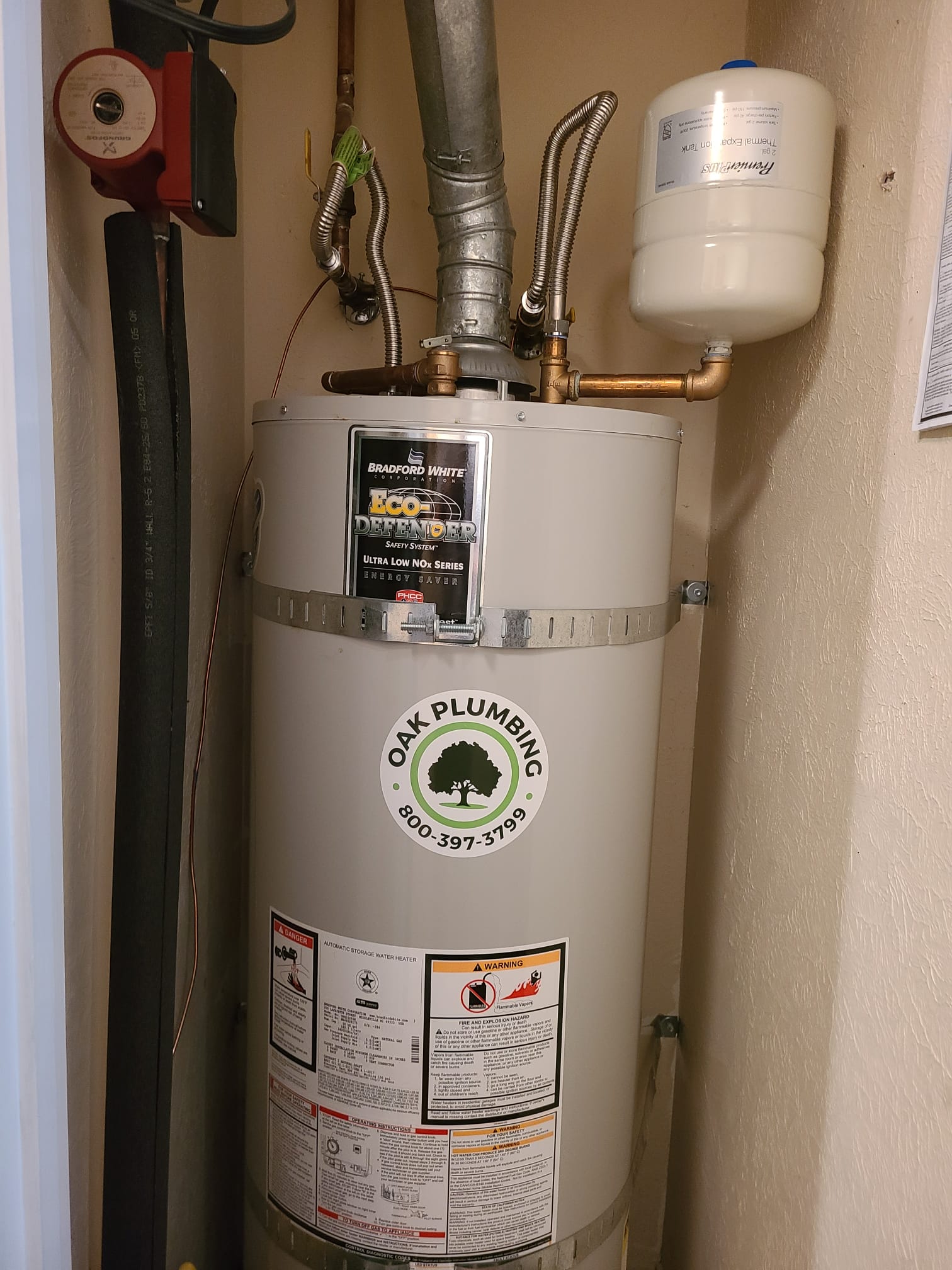
Why Does My Water Take So Long To Heat Up?
Do you ever get up in the morning and turn on the shower to find that the water is still cold? This problem can be frustrating, especially if you're in a hurry. In this blog post, Oak Plumbing will discuss some reasons why your water might take a long time to heat up. We will also provide some tips for how you can fix the problem. Keep reading to learn more!
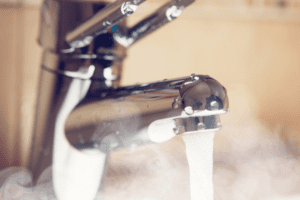
Why does my water take so long to heat up?
There are a few reasons why your water might take a long time to heat up. One possibility is that the water heater is not working correctly. If the water heater is not heating the water sufficiently, it will take longer for the water to become hot. Another possibility is that something is blocking the flow of hot water from the water heater to the taps. This issue could be a problem with the plumbing or a build-up of sediment in the water heater.
Specific reasons include the following:
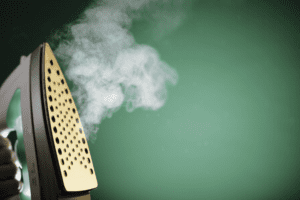
You have a low-volume fixture installed
If you have low-volume fixtures, such as a showerhead or a kitchen faucet that are not full flow, it will take longer for the hot water to reach the fixture. By installing low-flow plumbing fixtures, you can save money every month on your water bill. However, if you notice your hot water taking longer to arrive at the faucet, it may be due to the lower flow rate of these types of fixtures. This problem happens because they take longer emptying cooled water inside the supply lines.
Solution: If your water takes too long to heat up, upgrading to high-flow-rate models of faucets, showerheads, and other fixtures in the problem areas may be the best option. This solution is often most effective for fixtures that are farthest from your water heater.
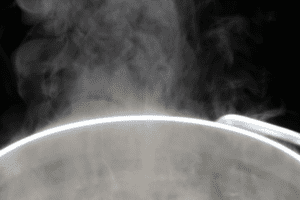
Your pipes are too large
The water that is still in the supply lines must come out before hot water can reach your faucet. This fact is why the first drops of water from your faucet are always cold. The wider the diameter of your water supply lines, and therefore takes longer for running water to become warm. Density and thermal conductivity will also affect how quickly warmth spreads through the pipes.
Solution: By hiring a plumber to replace water supply lines with smaller, less conductive piping, the water at that faucet or fixture will be able to heat up more quickly.
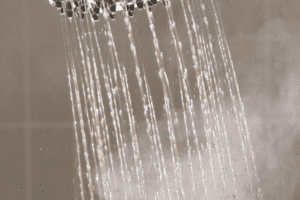
Your water heater temperature setting is too low
If the water heater temperature setting is too low, it will take longer for the water to reach the set temperature.
Solution: Change your water heater temperature setting to the desired temperature.
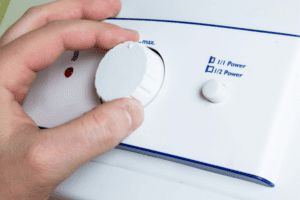
Competing appliances using hot water
If other appliances in your home use hot water, such as the washing machine or dishwasher, they can compete with the faucet for hot water. This competition can cause the water at the faucet to be cooler than it would otherwise be.
Solution: To avoid wasting hot water, run your dishwasher and washing machine at night or whenever you don't need it for bathing, showering, or hand-washing.
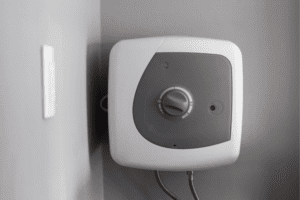
Faulty pilot light
A thermocouple or thermopile on a gas water heater keeps the pilot light lit. If either of these components fails, it will often extinguish the pilot light; however, other issues can also lead to an unlit pilot light. Frequently, faulty gas valves will cause a pilot light to go out. All you might need to do is replace the valve. However, like other metal objects, corrosion can occur if there's too much moisture exposure - this might happen if the heater is in a damp place or if the area gets flooded.
Solution: Replace your pilot light.
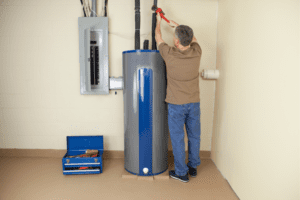
Clogged electronic ignition sensor
The gas electronic ignition system is a safe and reliable way to control flame ignition and maintenance in water heaters, furnaces, boilers, and other applications. An electronic-ignition system uses a sensor to measure voltage instead of a thermopile or thermocouple in order to produce a flame. If the flame sensor becomes clogged, it may stop the current from being read by the electronic-control sensor.
Solution: Typically, the sensor will start working again after being cleaned.
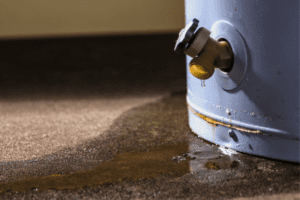
Loose parts
If there are any loose parts in the water heater, it will take more time for the water to heat. If water is dripping from a fitting, it's conceivable that the screws might just be loose. In addition, if the liquid is leaking out of the bolts on the heating element, the bolts might need additional reinforcement. If water is leaking out at the base of the tank, this may suggest that the tank has a hole.
Solution: You should tighten or replace loose parts.
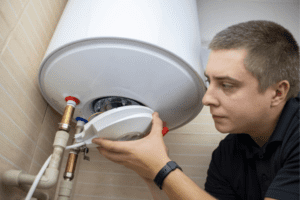
A poorly-insulated water heater
If the water heater is not well-insulated, it can take longer for the water to heat up.
Solution: wrapping your tank in an insulating blanket may help you save on energy bills by heating your water more efficiently. A new water heater with internal insulation is often a better solution.
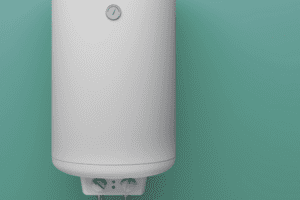
A cross-connection plumbing setup
If the plumbing in your home is set up so that cold water can backflow into the hot water lines, it can take longer for the water to heat up. If your plumbing system is outdated, it may be using cross-connection piping, which can reduce both the temperature and amount of hot water you have access to.
Solution: Depending on your needs, you can upgrade your piping or install a new tankless or traditional water heater.

Blown fuse or no gas
If your gas water heater suddenly stops working, it might be because the pilot light went out or there is no more gas. Many electric, tankless propane, and electric tankless water heaters may have common issues, such as a tripped circuit breaker or a blown fuse. Additionally, the flame sensor might be clogged and in need of cleaning. In some cases, the electronic ignition may produce only a faint or no light, even when receiving electricity.
Solution: Check your water heater's components, circuit breakers, fuses, and gas reserves.
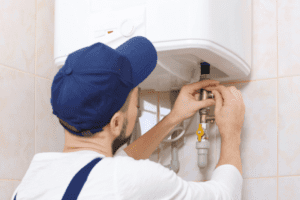
Old water heater
Your water heater may not produce an adequate hot water supply because it is approaching the end of its lifetime. If your water heater is more than eight years old or has significant wear and tear, this could also be why your hot water takes a long time to heat up ‒ or not at all.
Solution: Replace your water heater with a new version.
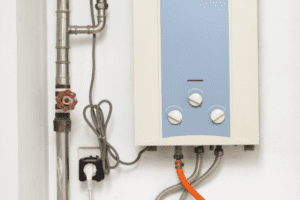
Faulty heating element
Your electric water heater has an upper and lower heating element. If these aren't functioning, you won't have any hot water or a constant stream of lukewarm water. No hot water usually indicates a problem with the upper heating element, whereas if only cold water comes out quickly, it's likely the lower heating element that needs attention. Luckily, though, heat elements don't often go wrong.
Solution: Replacing the defective heating element is relatively easy to do and usually doesn’t require replacing the water heating unit entirely.
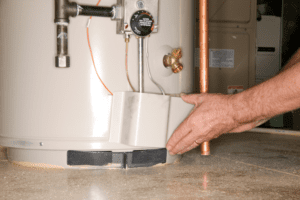
Thermostat problems
The thermostats, which control the temperature of the water that the heating elements produce, are attached to both upper and lower heating elements. Even though they malfunction less frequently than their adjoining heating elements, you should test them every time your system stops producing hot water.
Solution: If the valves are open, it's more likely than not that a malfunctioning thermostat is the issue, which might require replacing.
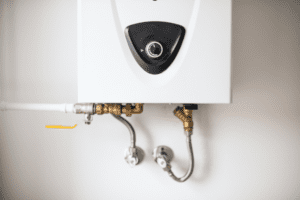
Your water heater is too far away
The greater the distance between your hot water tank and your shower or faucet, the longer it will take for the hot water to arrive. So, if your shower or kitchen sink is at one end of the house and your water heater is on the other, this could be partially why your hot water takes ages to warm up.
Solution: Install a new water heater closer to the appliances that use hot water.
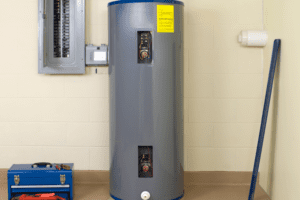
Your water heater is too small
If your family constantly runs out of hot water, it may be because your water heater cannot keep up with demand.
Solution: If you want to save money on your water bill, you should look into upgrading your current unit to a larger tankless water heater.
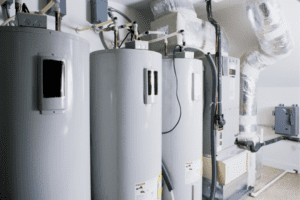
You have low water pressure
A drop in water pressure can inhibit your water heater’s performance ‒ and there are many reasons for low water pressure. In fact, it could be due to a partially closed meter valve, a partially closed main shutoff valve, old pipes, or a faulty pressure regulator.
Solution: Depending on the exact nature of the issue, you may need to open your valves, replace your pipes, or replace your pressure regulator.
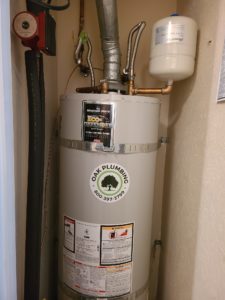
Sediment buildup
There may be a build-up of sediment at the bottom of your hot water tank that is long overdue for cleaning. Over time, dissolved minerals will settle and collect at the bottom of the tank. In most tanks, sediment will build up near the gas burner or electric heater. The sediment can block the transfer of heat.
Solution: Clean the sediment buildup out of your hot water tank.
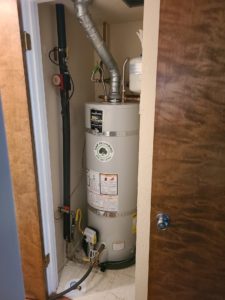
Do you have issues with your hot water? Call Oak Plumbing today!
We created Oak Plumbing to provide outstanding customer service, help our community, and reintroduce expert plumbing. The safety of your family is always our top priority. Our Oak Plumbing team knows it's essential to use the latest plumbing technology while still adhering to our family values. That's why we only hire licensed and background-checked professionals — so you can feel confident that your home is in good hands. Plus, most of our clients leave five-star evaluations, so don't hesitate to call us!

